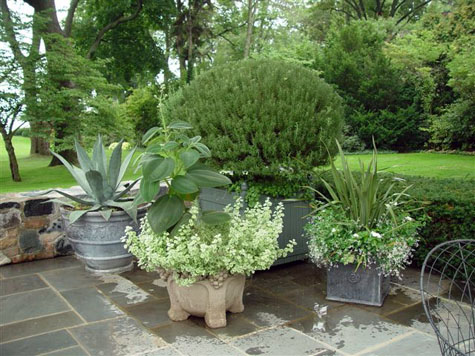 If all the color of my past few posts has put you on overload, perhaps these pots will suit you better. As I have said, annual plants are those plants that survive but one season-this is a large group-some of which have no flowers of consequence.
If all the color of my past few posts has put you on overload, perhaps these pots will suit you better. As I have said, annual plants are those plants that survive but one season-this is a large group-some of which have no flowers of consequence.
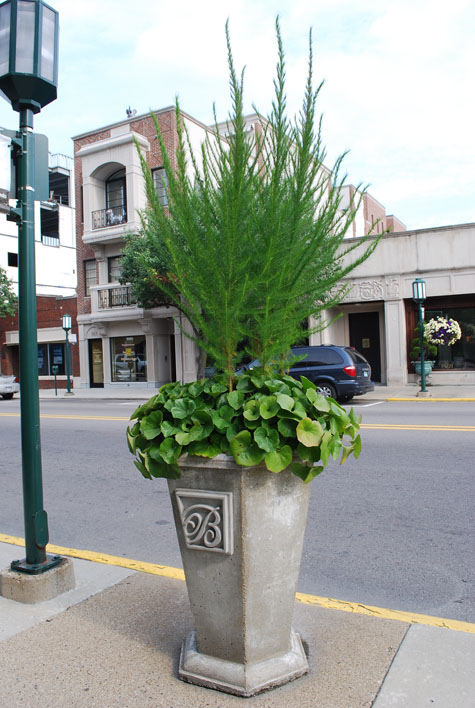 Annual plantings or pots without flowers can be very effective and attractive. Some locations for annuals do not have enough sun to support good flower production. Annual plants can be as much about their forms, their leaves, and their architecture, as they are about flowers. This very tall “elegant feather” plant-no longer in production at Proven Winners, is a great foil for the round-leaved farfugiums. There are very few greens I do not like. My yews go black green in the winter when it is really cold, much like this Moses in the Cradle. The chartreuse and yellow coleus “Wild Lime” provides lots of punch in shade.
Annual plantings or pots without flowers can be very effective and attractive. Some locations for annuals do not have enough sun to support good flower production. Annual plants can be as much about their forms, their leaves, and their architecture, as they are about flowers. This very tall “elegant feather” plant-no longer in production at Proven Winners, is a great foil for the round-leaved farfugiums. There are very few greens I do not like. My yews go black green in the winter when it is really cold, much like this Moses in the Cradle. The chartreuse and yellow coleus “Wild Lime” provides lots of punch in shade.
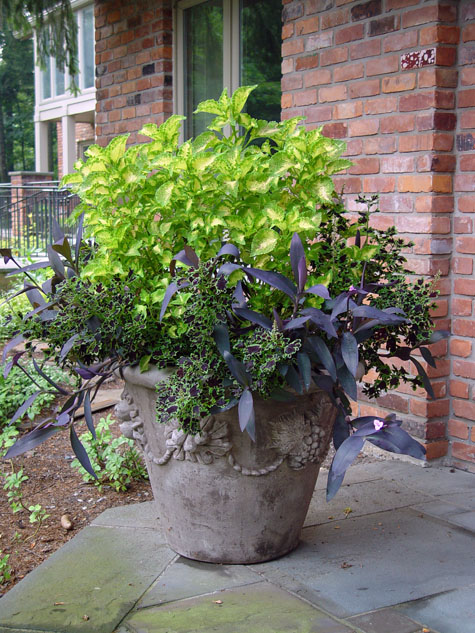 Chartreuse green is spring like, and fresh, no matter what time of year I see it.Grass after an electrical storm is so intensely dark gorgeous green-thus the term grass green. Lime creeping jenny is a versatile plant that highlights darker plants and obligingly trails.
Chartreuse green is spring like, and fresh, no matter what time of year I see it.Grass after an electrical storm is so intensely dark gorgeous green-thus the term grass green. Lime creeping jenny is a versatile plant that highlights darker plants and obligingly trails.
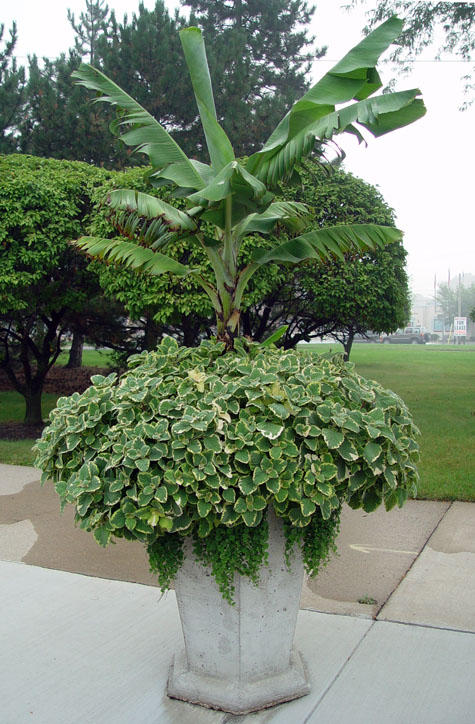 Green can be as much about texture and scale, as color. The slick, massive texture of this banana is complimented by the thick felted leaves of this variegated Plectranthus.
Green can be as much about texture and scale, as color. The slick, massive texture of this banana is complimented by the thick felted leaves of this variegated Plectranthus.
 Caladiums, calocasias, and cannas have spectacularly large foliage.
Caladiums, calocasias, and cannas have spectacularly large foliage. 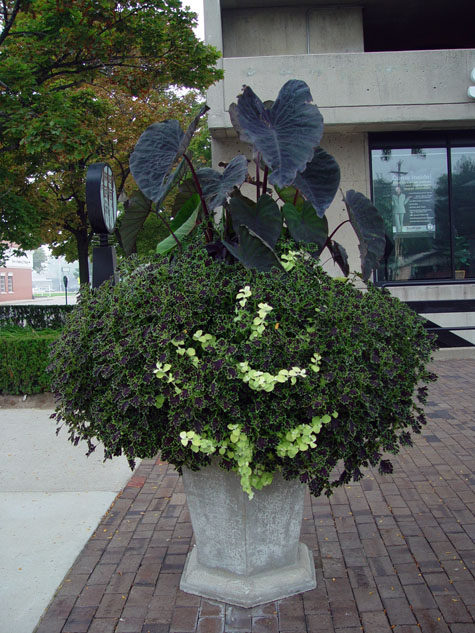 Calocasias and caladiums are thin-leaved (this refers to their “substance”); light will shine through them. Helicrysum both in lime and variegated leaf are densely felted.
Calocasias and caladiums are thin-leaved (this refers to their “substance”); light will shine through them. Helicrysum both in lime and variegated leaf are densely felted. 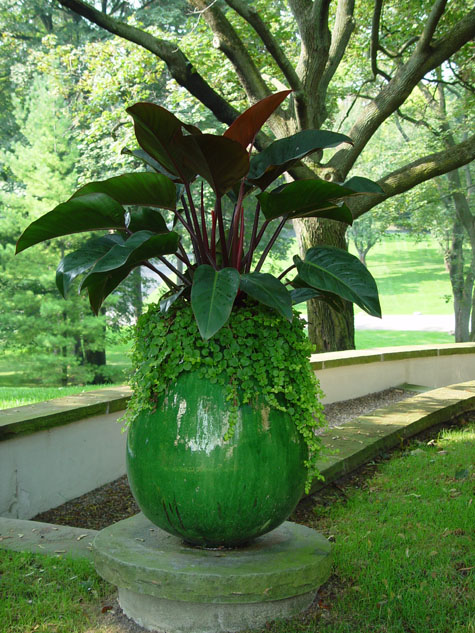
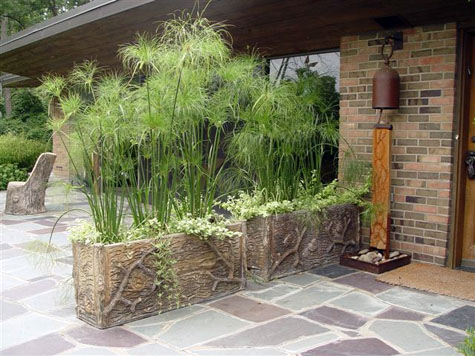
I confess I lump most houseplants into the genus “houseplant”, but most of them are good outdoors in shady spots. King Tuts, like other reeds and grasses have the added graceful beauty of motion.
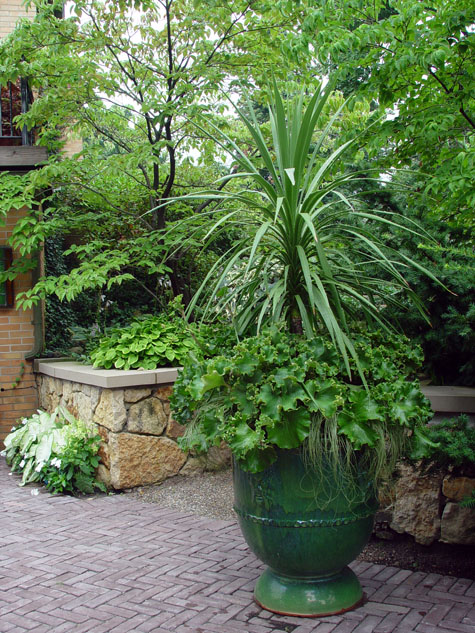 Phormiums, and dracaenas are stiff-strapped, and sword-like-an interesting contrast to this curly leaved farfugium. Cycads and escheverias have that dense waxy texture, and can be rounded, or spiky.
Phormiums, and dracaenas are stiff-strapped, and sword-like-an interesting contrast to this curly leaved farfugium. Cycads and escheverias have that dense waxy texture, and can be rounded, or spiky.

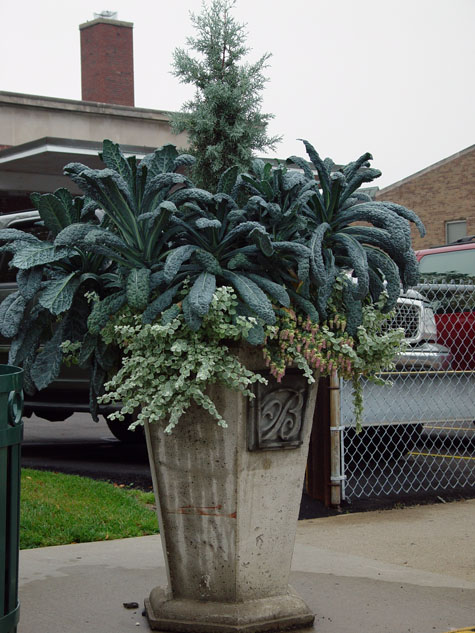 Tuscan blue kale has great size, a blistered leaf surface, and a very blue color-just the thing to pair with a blue juniper column, variegated licorice, and ornamental oregano “Kent Beauty” .
Tuscan blue kale has great size, a blistered leaf surface, and a very blue color-just the thing to pair with a blue juniper column, variegated licorice, and ornamental oregano “Kent Beauty” .
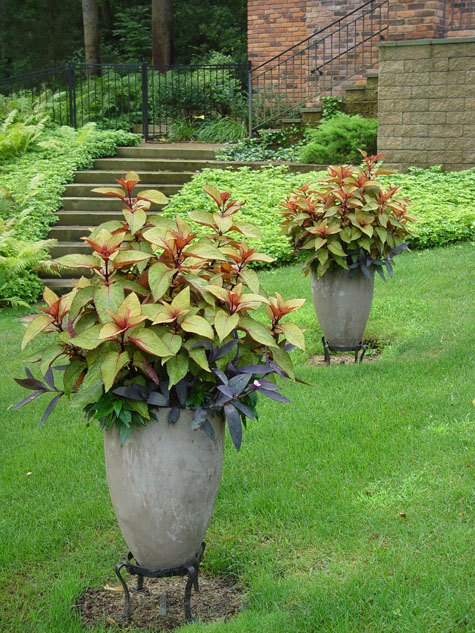 One of my favorite coleus is a yellow/olive color I call turtle green. The striped grass, miscanthus zebrina, is a happy companion to a plectranthus with the same color variation. The third element: the pairing of the plant material is complimented by the pairing of the pots close enough to encourage all the plectranthus to grow together.
One of my favorite coleus is a yellow/olive color I call turtle green. The striped grass, miscanthus zebrina, is a happy companion to a plectranthus with the same color variation. The third element: the pairing of the plant material is complimented by the pairing of the pots close enough to encourage all the plectranthus to grow together.
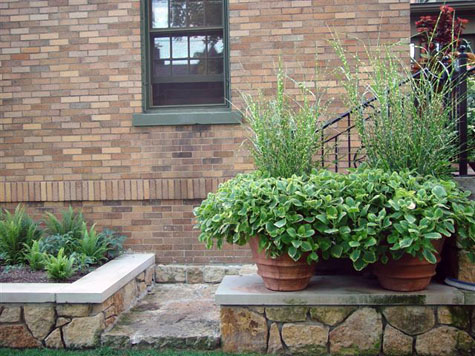 So many beautiful greens. So many ways in which green is beautiful.
So many beautiful greens. So many ways in which green is beautiful.